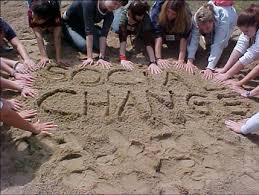 I’ve been rather quiet around here these past few and am soon to jump back on the horse (or in the saddle, or however that phrase goes). Just wanted to throw out a quick one, courtesy of the CCF listserv, from today’s WSJ:
I’ve been rather quiet around here these past few and am soon to jump back on the horse (or in the saddle, or however that phrase goes). Just wanted to throw out a quick one, courtesy of the CCF listserv, from today’s WSJ:
Money Matters Can Make or Break Marriages by Jeff D. Opdyke
Even in the best of times, couples regularly argue about finances. But at this juncture, when so many Americans are feeling stung and frustrated by a weak economy, a housing-price collapse, and a stock-market crash, it’s particularly critical that newlyweds — and even long-time spouses — are on the same page when it comes to money.
Sigh. Note to world: though Marco’s job situation is still precarious, we are going strong, in our 9th month of marriage. I chalk it up to open communication, giving each other lots of space in which to unfold, and of course our kitten, Tula, who keeps it real.

 Check out this article in the LA Times,
Check out this article in the LA Times,  My latest at Recessionwire.com is now up:
My latest at Recessionwire.com is now up:  So check this out:
So check this out: My latest at Recessionwire.com is now up:
My latest at Recessionwire.com is now up: Can someone puh-lease get all the Wall Street
Can someone puh-lease get all the Wall Street  According to Kimberly Palmer in this week’s
According to Kimberly Palmer in this week’s  …what of the youth shaped by what some are already calling the Great Recession? Will a publication looking back from 2030 damn them with such faint praise? Will they marry younger, be satisfied with stable but less exciting jobs? Will their children mock them for reusing tea bags and counting pennies as if this paycheck were the last? At the very least, they will reckon with tremendous instability, just as their Depression forebears did.
…what of the youth shaped by what some are already calling the Great Recession? Will a publication looking back from 2030 damn them with such faint praise? Will they marry younger, be satisfied with stable but less exciting jobs? Will their children mock them for reusing tea bags and counting pennies as if this paycheck were the last? At the very least, they will reckon with tremendous instability, just as their Depression forebears did. I’m THRILLED to announce that my nationally touring (whohoo!) intergenerational panel, “Women, Girls, and Ladies” will be
I’m THRILLED to announce that my nationally touring (whohoo!) intergenerational panel, “Women, Girls, and Ladies” will be 